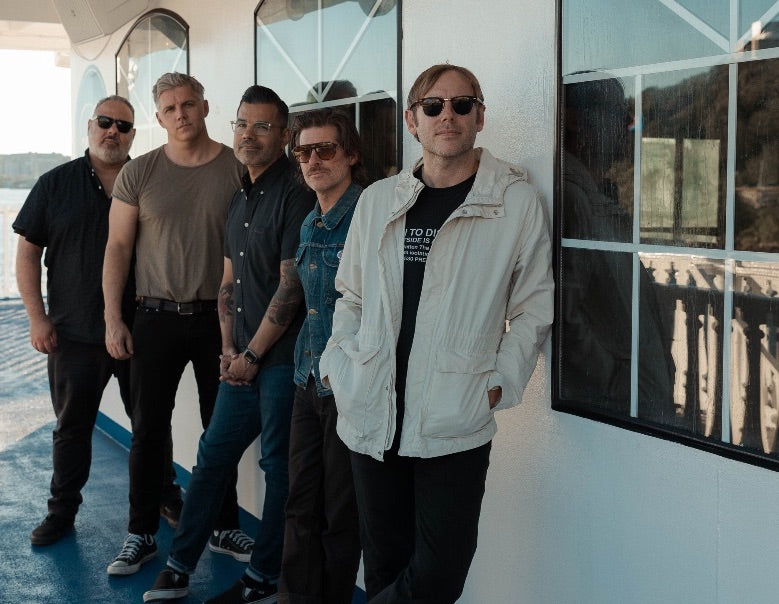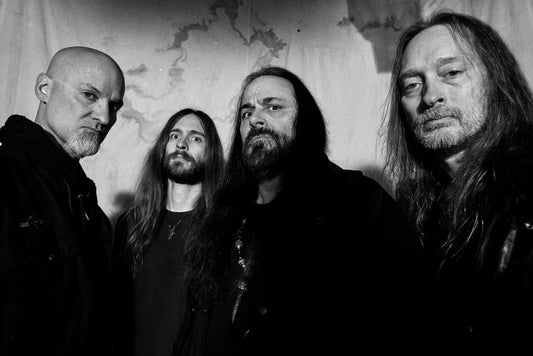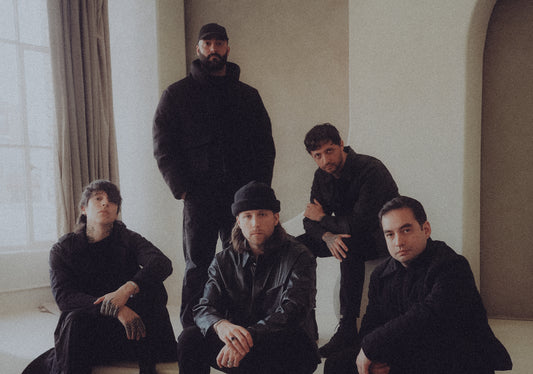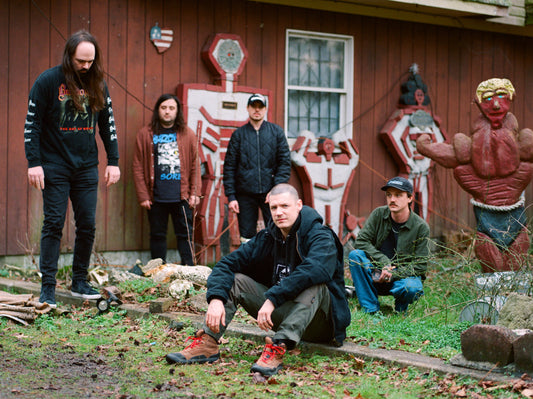Story by Maddy Howell
Noting that the average life expectancy of a musician is just 54 years, when Thursday frontman Geoff Rickly reflects on the band’s 2003 album War All The Time, his tone is laced with a stark sense of humor.
"Honestly, if you would have told my younger self that we’d be celebrating twenty years of this record… I’d just be shocked that we’re still alive two decades later!”, he chuckles.
Now, at 45 years old – much to surprise of their younger selves - Geoff and Thursday drummer Tucker Rule prepare to embark on a tour celebrating the 20th anniversary of their third album.
Marking the band's transition to major label Island Records after a tumultuous fallout with Victory, Thursday’s follow-up to breakthrough 2001 album Full Collapse was the product of a meticulous recording process spanning eight months. A thematic exploration of the complexities of love amid a world at war, War All The Time has gone on to resonate with the Earth’s ongoing challenges since its release, influencing countless of contemporary bands in the process.
An album of distinct hopefulness within a world that often feels increasingly bleak, it serves as a testament to the enduring spirit of a band that has not only weathered the ongoing storms but has continually found hope in the darkest of corners.
As Thursday gear up to hit the road - joined by Rival Schools and Many Eyes - Geoff and Tucker reflect on the twenty years of love, chaos, and unexpected full circle moments War All The Time has brought to the world.
War All The Time was the first Thursday album on Island Records after the fallout with Victory. At that time, your deal with Victory stated that you could only leave them to join a major label, which must have felt far-fetched for a hardcore band from New Jersey…
Geoff Rickly - “Funnily enough, I think we only noticed that loophole in the contract when we were trying to get out of it.”
Tucker Rule - “It was around the time when going onto a major was seen as a bad thing in the scene, and the term ‘sell out’ was thrown around a lot. It was very conflicting because we only started a band to play in Geoff's basement and to play with other bands that we liked.”
Rickly - “We had friends that wanted to be on major labels, but for a band like us… what would we even do on a major label? To be honest, it didn’t seem like it could get worse than staying on Victory though, so we just thought, ‘Fuck it’.”
Following the success of Full Collapse - once the dust had settled with label issues - what was the vision for album three?
Rule - “That time was a blur because it was such a huge period of transition for the band. I would almost go as far as to say it was traumatic. We were just a bunch of kids trying to make music who suddenly started doing well. People were coming to our shows, and then the whole Victory thing happened, and a major label became involved. It was great, but writing the record was stressful because the whole operation was super dense. I think War All The Time came out as a dense-sounding record because of that, in a good way.”
Rickly - “It’s crazy that the record turned out so well, because we weren’t all in the best headspace. We got lucky that being in a bad headspace made this cool, fucked up, dark record instead of it just being a total disaster. The first thing that we wrote for it was the riff from ‘Asleep In The Chapel’, which we wrote whilst we were working on the Five Stories Falling EP.
After that, I remember sitting at my parents’ house with Tom [Keeley, guitarist] with our guitars, and writing part of ‘Between Rupture And Rapture’. I remember Steve [Pedulla, guitarist] coming up with the riff for ‘Signals Over The Air’ too. We were just in our practice space working on things, and we were trying to figure out this one transition in ‘For The Workforce, Drowning’ for eight hours. It was one measure, but everybody was disagreeing, and nobody could count it the same way. It wasn't that hard to figure out, but because we all thought we knew the right answer it became this pointless fight.”
Rule - “The term ‘too many cooks in the kitchen’ is very true, but when you have too many cooks in the kitchen who are all trying to count at the same time… it’s very bad.”
Rickly - “It's like having a bunch of cooks, but it's not in a kitchen. It’s like you’ve got a bunch of cooks working on a NASA launch. You should never bring math into the equation.”
You worked with producer Sal Villanueva on the record, who you’d previously worked with on Full Collapse. Why did you decide that was the right choice?
Rickly - “There were a million different reasons, but part of it was that we had this amazing thing going. Everything was changing around us, so I think we were trying to make sure that there were a few things that didn't change. We wanted some things that made us feel comfortable and safe because every time you're thrown into a new situation everybody looks at you like you're an idiot. I think it's changed for the better in studios now, and people are a bit more supportive, but it used to be a pretty toxic environment. You would get thrown into situations and people would treat you as subhuman. I think we wanted to stay somewhere that felt familiar to avoid falling into that trap.”
Rule - “Also in the back of our minds we knew that signing to a major label would be a demerit against us as far as public perception went. Going with Sal was our way of being punk and saying that we weren’t going to sell out. We were making music the same way, it just happened to be on a different level.”
The recording process ended up being very thorough this time though, right?
Rickly - “I'm just thinking of recording the drums now. We needed three perfect takes of every song on three different drum kits… why did we need that?!”
Rule - “It was like going to a workout class for me! Three drum kits, three perfect takes, and it was all done without any music. It was just me playing to a metronome, so I had to guess whether it would feel good when the band played on it. We knew that this record was going to have more eyes on it, and it was a big record for the studio too. We all wanted to step it up a level.”
Rickly - “Sal didn't want to get into the mix of a major label record and have any regrets about the drum sound. He was extra cautious, but in the end, I don't think he really needed to be. We were all just afraid of screwing it up because we weren’t being thorough enough, so everybody was trying to make sure they weren't the one who fucked it up.”
Was it a longer, more gruelling process than you’d experienced before as a band, then?
Rickly - “We were in the studio for eight months, whereas we did Full Collapse in twenty days. The studio would buy 40 amps, line them up in the live room, and Steve and Tom would each play every part of every song through each amp. Two weeks would go by without a note being recorded; we were just trying gear out. It would feel insane because there were no windows in the studio. We were in this big brick building day and night for months.”
Rule - “The studio was called Big Blue Meenie, and it was true to its name. It's all fucking blue inside. We lost our minds a little bit, but we didn't get into this industry because we were all sane, that's for sure.”
There are a lot of things that make War All The Time a huge milestone in Thursday’s history, but importantly it was the first time you delved into the idea of love. It was an era of punk songs about heartbreak, but this album delved much deeper than that…
Rickly - “It's a theme that I've thought about a lot, both in Thursday's work and elsewhere in my writing. I wanted to explore what love means in the context of a place that's at war, and in a society where love isn't ever prioritized. To me, love is a very complicated idea in the context of the world that we live in. At the time that we were making this record, we were watching the US declare war on Iraq. They say that history doesn't repeat itself, it rhymes, but maybe it just never ends. It felt like an appropriate time to be talking about love in the context of all this stuff that was going on. I never really liked songs that just said, ‘You hurt me, you broke my heart, and now I'm so sad and I hate you’. There was a lot of that in the scene around us at the time though.”
It’s interesting that you mention history repeating itself, because War All The Time still feels apt for the world’s situation two decades on. Especially when you look at a track like ‘This Song Brought to You By A Falling Bomb’ which is about wanting to escape the constant noise of the news and the overwhelming pressure of the outside world…
Rickly - “People say that comedy is just tragedy plus time, but then comedy plus time becomes this really bleak other thing. It isn’t funny, and it's so dark that this keeps going on. It takes on a different kind of tone, and right now the record has this gravity that asks, ‘How can this keep going?’ There are protest songs that have been written by people who have gotten older and become conservative. Half of the people who were singing songs like this are now on the other side and they're pro-bombing. It’s so dark.”
Rule - “You're always hoping that something changes, but it just seems to be getting worse and going in stranger directions. I don't think that we thought things would turn out this way when we wrote this record. We hoped for things to get better and for people to come around, but the evolution of it makes it even darker.”
Despite that, hope is something that runs through War All The Time. Whilst much of the record deals with the ugliness of life, ‘Tomorrow I’ll Be You’ feels like the point of redemption…
Rickly - “That song was originally written as a counterpoint to ‘Jet Black New Year’, and sometimes I think that song should have been on ‘War All The Time’ too. ‘Jet Black New Year’ was about the absence of hope, and ‘Tomorrow I’ll Be You’ plants the seed of, ‘What if things could be different?’. This world can be very disappointing and upsetting, but there's some beauty there. There are all these dirty, sickening things around us, but isn't it beautiful to watch it burn? There is a strange, bleak hope in the record, and I never give up hope. As long as there are people who still recognise that the world is sick, we can't lose hope.”
Obviously War All The Time was a huge milestone for this band, and it reached the Billboard Top 10 upon its release. How has your perception of the record changed over time?
Rickly - “It's definitely grown on me, but it's still a tough record to play.”
Rule - “It’s so tough, but I’ve always loved it. It was hard to make, and there were days where we were in the rehearsal space scrutinizing over one single note. Sitting behind the drums trying to play these songs - even after honing my skills for the past 20 years - it's still a challenge. I feel like we were on to something then though, and the record has stood the test of time. I can't say enough good things about it, other than I wish we could have enjoyed the writing and recording process a bit more.”
Rickly - “At the time that we were touring it, I was unsure about it. It was so dark, I felt weird, and the songs were at the very top of my ability as a singer. I could do it once in the studio but doing it every night in front of people was hard. It fucked me up, and I was beating myself up every night. I felt so much shame that I couldn't pull off the record live to the level that I wanted to be able to, and I felt like the only one in the band who couldn't pull it off.
Now, I see the record from the outside, and I don't see the chaos, the heartbreak, or the confusion of the time. I can sing those songs every night and relive the record, which is a pretty rare gift. It can still be hard to play, and it’s challenging at times, but I just love that we get to do it 20 years later. If I could do it over again, maybe I would do it differently, but that weird, fucked up process is what gave us this record.”
Listening back, do you think that the hopeful energy of the record came from your innocence as musicians and people at the time?
Rickly - “Innocence is a huge part of both Full Collapse and War All The Time. I think that's why people love those records so much, but I don't think we could see it from the inside back then. I would have looked at that innocence as naivety, and if I had seen it, I would have wanted to change that part of the band. Thank God I couldn't see it, because it's part of what makes those records so special. It's just a bunch of kids from New Jersey.”
Rule - “We were on a major label, and we were professionals, but we were still just a bunch of kids. We wrote War All The Time in the same way that we wrote Full Collapse but without even realizing it - you’re growing.”
Rickly - “We were supposed to be professionals, but we didn’t even know if guitar parts went together! Somebody would be like, ‘Well, this one's major, and that one's minor’, and we'd be like, ‘...What does minor mean?’ In our minds, one sounded cool, and the other sounded cool too.. shouldn't they go together?”
Rule - “Then it became a question of, ‘How do we mash them together?’… so many of these songs happened because we just made it work.”
That idea has moved through the generations, and now we have bands like Touché Amoré and Deafheaven who are embracing that same mentality. What has it been like to see the influence that War All The Time has had on the scene over the years?
Rickly - “There was a moment around 2008 when bands started telling us how Thursday had had a huge influence on them. I’d listen to those bands and think, ‘Really? This doesn't sound that good… maybe we suck!’ The kids would be so nice, but I just couldn't see it. Once we saw bands like Deafheavan and Touché Amoré coming up and citing us as an influence, that felt great. That’s all the stuff I love about music, and I can hear our influence in it.”
Rule - “It helps with the crippling self-doubt that we all have. You step onstage at Coachella and think, ‘What the fuck am I doing here?’ but then you think back to the times that you've influenced other musicians. It helps you feel like you belong, and I don't know if we could do it without that.”
Rickly - “I remember reading early reviews of our band and people would say that we didn’t know how to play and that we didn’t get it. We made it work for so long, and now the kids can take something from that. There's a roadmap for them, and it takes away some of their self-doubt. I see all these kids playing with such confidence, and it’s cool that we could help them not be afraid of anything.”
You’re going to be heading out on the road celebrating War All The Time soon, and you’ll be joined by Rival Schools and Many Eyes (the new project from former Every Time I Die vocalist Keith Buckley). Around the time of the album’s release in 2003, you toured with Rival Schools and Every Time I Die, so this feels like a full circle moment…
Rule - “It’s wild to be on tour with your idols. They were our idols back then, and they're our fucking idols still now. We've remained friends all this time, and it’s crazy because nobody does it better than Walter Schreifels. I remember thinking Rival Schools were this serious bunch of musicians, and then they shoved me in the back of the bus and locked me in there. I thought I was gonna die! Everyone was laughing, except for me.”
Rickly - “When I was a kid, I idolized Walter’s bands. It's such a cool thing to get to tour with him as a friend and a fan. I remember that 2003 tour also happened around the time that Every Time I Die released Hot Damn!. Somebody had a pair of Hulk gloves, and they’d get thrown around whilst different people put them on. Every night I’d ask Andy [Williams, guitarist] from Every Time I Die to get up and wrestle me on the stage. I was around 125 pounds, which is probably the same weight as one of his arms. Back then, we were all just a bunch of kids having fun.”
How do you think the early twenties versions of yourselves would feel knowing that you're still celebrating War All The Time over two decades later?
Rule - “I don't think I would have necessarily believed it. It's crazy that we’re still playing music, let alone playing a record that people cared about. With any job you’re going to wake up some days and not feel like doing it that night, but as soon as you step up there it all changes. There's something about all our records that zap me back to a time of such excitement, and it all goes away. All of that fucking self-doubt disappears, and you just feel grateful. I don't think that there's any other job that reminds you how grateful you are every single night.”
---------------------------
Thursday begin their 'War All the Time Live' Tour January 25th with support from Rival Schools and Many Eyes. See the complete list of dates and cities below. Get tickets - HERE

THURSDAY ON TOUR
WITH RIVAL SCHOOLS + MANY EYES:
1/25 — Buffalo, NY — Town Ballroom
1/26 — Detroit, MI — The Majestic Theatre
1/27 — Columbus, OH — Newport Music Hall
1/28 — McKees Rocks, PA — Roxian Theatre
1/30 — Chicago, IL — Concord Music Hall
1/31 — Minneapolis, MN — First Avenue
2/1 — Omaha, NE — Slowdown
2/2 — Denver, CO — Summit Music Hall
2/3 — Salt Lake City, UT — The Depot
2/5 — Seattle, WA — The Crocodile
2/6 — Portland, OR — Roseland Theater
2/8 — Sacramento, CA — Ace Of Spades
2/9 — San Francisco, CA — August Hall
2/10 — Santa Ana, CA — Observatory OC
2/11 — Mesa, AZ — The Nile Theater
2/13 — Austin, TX — Mohawk
2/15 — Jacksonville, FL — Jack Rabbits
2/16 — Fort Lauderdale, FL — Revolution Live
2/17 — Orlando, FL — The Beacham
2/18 — Atlanta, GA — The Masquerade
2/20 — Philadelphia, PA — Theatre Of Living Arts
2/21 — Boston, MA — Paradise Rock Club
2/22 — Baltimore, MD — Baltimore Soundstage
2/23 — Virginia Beach, VA — Elevation 27
2/24 — New York, NY — Irving Plaza




